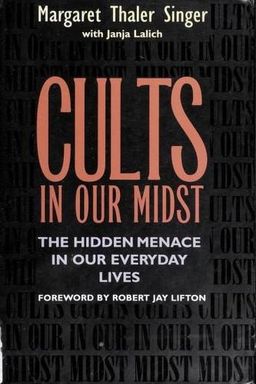Hakkında
Unvan:
Yazar
Doğum:
5 Nisan 1945
Okurlar
2 okur okuyacak.
1 okur yarım bıraktı.
Kitaplar
Sözler ve Alıntılar
Who Joins Cults? - The "Not Me" Myth
People like to think their opinions, values, and ideas are inviolate and totally self-regulated. They may grudgingly admit that they're influenced slightly by advertising. Beyond that, they want to preserve the myth that other people are weak-minded and easily influenced while they are strong-minded. Even though we all know human minds are open to influence —whether or not that is a comfortable thought—most of us defensively and haughtily proclaim, "Only crazy, stupid, needy people join cults. No one could ever get me to commit suicide or beat my kids or give my wife over to a cult leader. No one could ever talk me into anything like that."
As I hear people say that, I silently ask, " You want to bet?"
Sayfa 15
Defining Cults - Who Joins Cults?
When we hear of cults, scams, and individuals' being controlled and influenced by others, we instinctively try to separate ourselves from those persons. It seems a point of valor and self-esteem to insist that "no one could get me to do such things" when hearing about situations of intense influence. Just as most soldiers believe bullets will hit only others, most people tend to believe that their own minds and thought processes are invulnerable. "Other people can be manipulated, but not me," they declare.
Sayfa 15
Who Joins Cults? - Yes, You
Nevertheless, the fact remains that even apart from unsettling socioeconomic conditions and certain relevant family factors, any person who is in a vulnerable state, seeking companionship and a sense of meaning or in a period of transition or time of loss, is a good prospect for cult recruitment. Although most contemporary cults primarily recruit young adults, preferably single, some—especially the neo-Christian cults—seek entire families, and even the elderly are targets for some groups.
What do the cults offer to lonely, depressed or uncertain persons? In one form of another, each cult purports to offer an improved state of mind, an expanded state of being, and a moral, spiritual, or political state of righteous certainty. That supposedly beneficial state can be reached only by following the narrowly prescribed pathways of a particular group master, guru, or trainer. To grasp that approach to life, the new recruit—the babe, the preemie, the trial member, the spiritual god-child, the lower consiousness one, as certain groups label the beginner—must surrender his or her critical mind, must yield to the flow of force, must have childlike trust and faith.
Sayfa 20
Defining Cults - Origin of the Group and Role of the Leader
In most cases, there is one person, typically the founder, at the top of the cult's structure, and decision making centers in him.
These leaders typically have the following characteristics.
Cult leaders are self-appointed, persuasive persons who claim to have a special mission in life or to have special knowledge. For example, leaders of flying-saucer cults often claim that beings from outer space have commissioned them to lead people to special places to await a spaceship. Other leaders claim to have rediscovered ancient ways to produce enlightenment or cure disease, while yet others claim to have developed inventive scientific, humanistic, or social plans that will lead followers to "new levels" of awareness, success, or personal and political power.
Cult leaders tend to be determined and domineering and are often described as charismatic. These leaders need to have enough personal drive, charm, or other pulling power to attract, control, and manage their flocks. They persuade devotees to drop their families, jobs, careers, and friends to follow them. Overtly or covertly, in most cases they eventually take over control of their followers' possessions, money, and lives.
Cult leaders center veneration on themselves. Priests, rabbis, ministers, democratic leaders, and leaders of genuinely altruistic movements keep the veneration of adherents focused on God, abstract principles, or the group's purpose. Cult leaders, in contrast, keep the focus of love, devotion, and allegiance on themselves. In many cults, for example, spouses are forced to separate or parents forced to give up their children as a test of their devotion to their leader.
Sayfa 8
Who Joins Cults? - The "Not Me" Myth
The average person looks down on those who get involved in cults, get taken in a scam by some operator who bilks people, or remain in an abusive group or relationship for long periods. That only happens to weak and silly people, the person boasts, generating for herself or himself a category called "not me" in which to place the victims of cults, scams, and intense influence. There is an almost universal aversion to accepting the idea that we ourselves are vulnerable to persuasion. I have heard this from journalists, college professors, neighbors, passengers seated next to me on a plance, people I talk with in the street, graduate students, gardeners, sales clerks. Neither education, age, nor social class protects a person from this false sense of invulnerability.
Several years ago when I was lecturing in Switzerland, a Swiss psychiatrist opened the program by saying: "We have such an educated, close-knit, middle-class society, we have no cults here. Cults will never get an inroad in this country." I then provided literature containing the street addresses of various large, internationally known cults, as well as many small ones, operating in Zurich and other Swiss cities. Few, if any, countries in the world are without cults.
Sayfa 16
İletiler
Henüz kayıt yok
Yorumlar ve İncelemeler
Henüz kayıt yok
